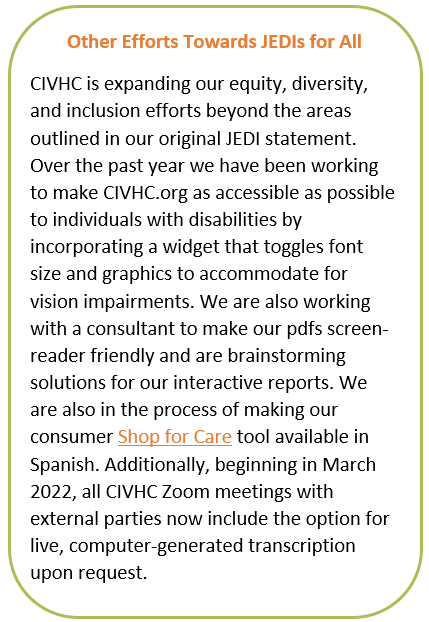When CIVHC made a commitment to address racism and health inequities in 2020, we recognized that systemic racism has permeated our society for centuries and continues to disproportionately disadvantage people and communities across our nation. As an organization whose mission is to improve the health of all Coloradans, we simply could not turn a blind eye knowing that racism and social disparities are the primary drivers of health inequity.
We committed to taking deliberate steps to identify and highlight the racial and socio-economic drivers of health inequity in order to accomplish our mission of the Triple Aim. Our commitment was three-pronged and addressed improving health equity and ending social injustice from different vantage points:
- how we as individuals and as an organization,
- as administrator of the Colorado All Payer Claims Database (CO APCD), and
- as partners with other Change Agents.
We started our journey by forming a Justice, Equity, Diversity and Inclusion (JEDI) Committee (thank you to the Communications Network for hosting an event where we stole this acronym shamelessly!). The JEDI Committee is comprised of staff across all departments of CIVHC and includes people of various genders, races, cultural backgrounds, and roles throughout the organization.
The JEDI Committee began focusing strategies towards our commitment in four primary areas:
- Staff Education
- Staff Diversification
- Enhancing Data
- Expanding Partnerships
We are very proud of what we’ve accomplished so far, and have identified longer-term goals as well.
Staff Education
To educate staff, the JEDI team shares resources, events, and trainings from the numerous offerings that are available from local and national organizations on advancing health equity. We then share those learnings during our JEDI meetings and implement policies and best practices as applicable. In the upcoming year, we’re planning to do a company-wide health equity training specific to gathering, analyzing and presenting health data.
Staff Diversification
We’ve made significant progress towards staff diversification during the last few years, due to a number of factors. We’ve expanded where we place our job postings and now work with a company focused on getting a diverse pool of candidates. Our job description language includes a diversity statement, provides transparent salary ranges, and we’ve revised job descriptions to allow for experience in lieu of solely education. There is definitely more to do in this area and we have goals to revamp our entire hiring process to be more inclusive and follow best practices such as ensuring the interview panel is made up of people from diverse backgrounds.
Enhancing Data
As administrators of the CO APCD, we’ve been working to figure out how to provide data and analytics to improve health equity. We’ve made great strides towards marrying the health care information we collect in the CO APCD with important information on race, ethnicity, and other social factors. We’re also working with the payers to improve the data they submit to the CO APCD, starting with race, ethnicity, language preference and gender identity.
Socio-Economic Information
With help from our data vendor, HSRI, CIVHC “geocoded” the CO APCD, which tags each person in the CO APCD with a latitude and longitude assignment that can be paired with other data sources like census tract-level data. We’ve also built a geocoded socio-economic background (GSB) score which allows us to overlay the claims data with the American Community Survey data to investigate things like income level, housing status, and preferred language on health care utilization, access and cost.
In addition to geocoding, our team also recently conducted an analysis of social needs codes, called “Z codes”, being submitted to the CO APCD. Z Codes became available in 2016 and are a subset of ICD 10 codes that identify non-medical factors that may influence a patient’s health status. The analysis shows that only a small percentage of people in the CO APCD have Z codes on their claims that identify social needs, but of those who do, family or primary support issues, housing and economic insecurity and upbringing are among the top issues.
Race and Ethnicity Data
In 2019, it became mandatory for payers to submit race and ethnicity data to the CO APCD based on the guidelines of the U.S. Office of Management and Budget (OMB), which include an indicator for Latino/Non-Latino and five race fields: American Indian or Alaska Native, Asian, Black or African American, Native Hawaiian or Other Pacific Islander, or White. CIVHC additionally collects data on races identified as “other” or “unknown.” Medicaid and Medicare Fee-for-Service data collect and submit comprehensive race and ethnicity data, but for commercial payers, most of the submissions we receive indicate that race and ethnicity is unknown. We’re working with the commercial payers to find solutions to improving those fields in the future.
Language Barriers
In the latest rule change to update the Data Submission Guide (DSG) to version 13, we included a new field that payers will begin submitting this year that will identify a person’s language preference. Identifying language preference in the data will help us understand social determinants of health related to language barriers and access to the health care system.
Gender Identity
Collecting information about an individual’s gender identity and sexual orientation is incredibly difficult but also vital. LGBTQ individuals experience significant disparities in accessing health care and additional inequities receiving care. Across the nation, organizations are working on determining the best ways to collect this information to support interventions in this population. As an initial step, CIVHC added a non-binary option to the gender field of the CO APCD Data Submission Guide in 2019. We continue to work with national partners on how best to gather this information.
Expanding Partnerships
We know that working in tandem with other like-minded, equity focused organizations is one of the best ways for us to support advancing health equity for Colorado and the nation.  Together, we can make more meaningful, long-lasting changes, and accelerate progress more rapidly. We’re working with a number of organizations along this front, including Stanford University and Trajectory Health who are using CO APCD data paired with other data sources to understand the social factors impacting COVID. We’re also working with the Colorado Regional Health Information Organization (CORHIO, a Contexture organization), and multiple state agencies like the Office of e-Health Innovation, the Department of Health Care Policy and Financing (HCPF) and the Division of Insurance to measure equity for a number of projects like telehealth utilization and the Colorado Option.
Together, we can make more meaningful, long-lasting changes, and accelerate progress more rapidly. We’re working with a number of organizations along this front, including Stanford University and Trajectory Health who are using CO APCD data paired with other data sources to understand the social factors impacting COVID. We’re also working with the Colorado Regional Health Information Organization (CORHIO, a Contexture organization), and multiple state agencies like the Office of e-Health Innovation, the Department of Health Care Policy and Financing (HCPF) and the Division of Insurance to measure equity for a number of projects like telehealth utilization and the Colorado Option.
In spite of the significant strides we’ve made in over a year and a half since embarking on this work, we recognize that there is more work to be done. We’re learning that there is a lot we didn’t and still don’t know, and we are approaching our efforts knowing it’s a journey. This must and will be an ongoing effort that permeates every part of our work moving forward. We want to thank all of the incredible people and organizations that are paving the way as leaders in this space and look forward to continuing to support your work and learning alongside you in this journey towards social justice and equity for all.
If you have suggestions on how we can enhance our JEDI work or support yours, please contact us at info@civhc.org.

